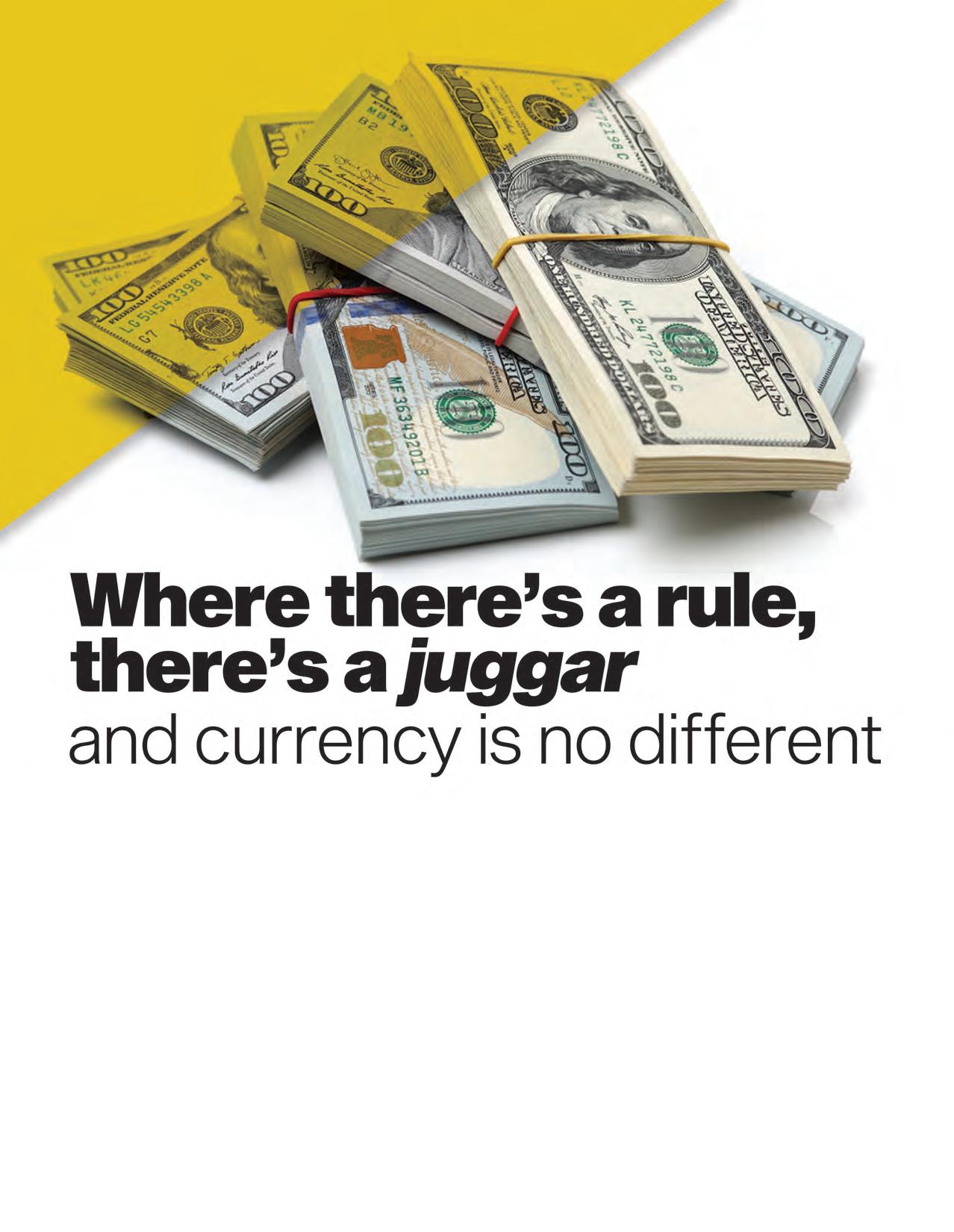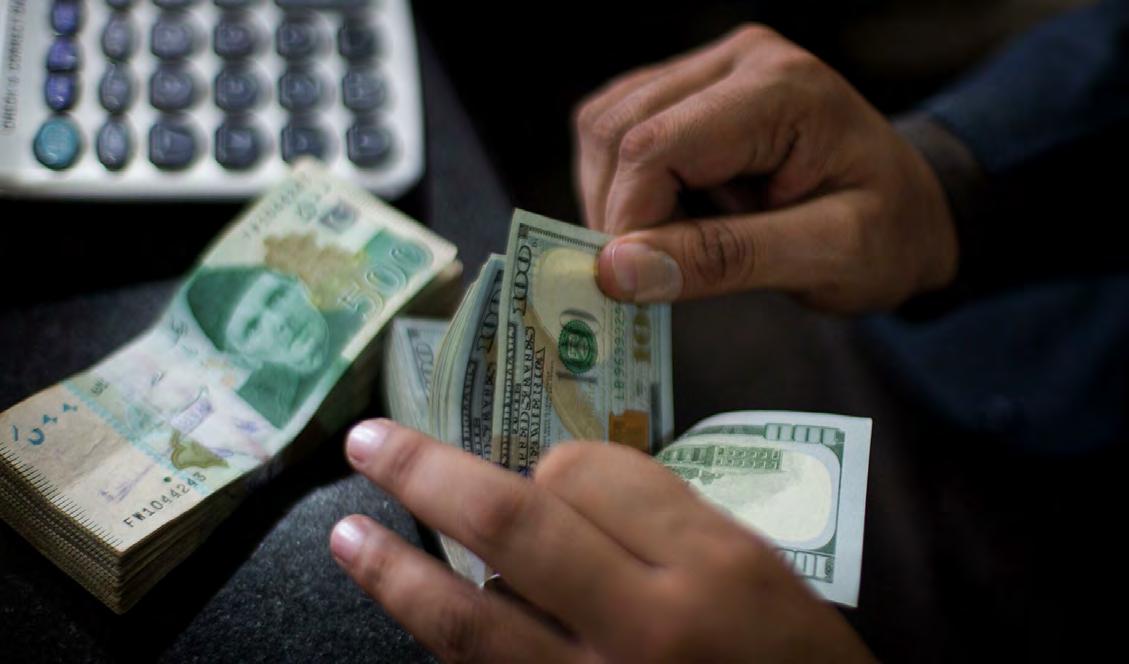
11 minute read
Where there’s a rule, there’s a jug gar, and currency is no different
Profit tells the tale of how rethinking regulations is the answer to dollarization in this dramatised explainer
By Ariba Shahid
Advertisement
{A melody is heard, played upon a flute. It is small and fine, telling of grass and trees and the horizons. The curtain rises and simultaneously the tune fades into the sounds of the hustle and bustle of traffic. Before us on stage is the entrance to a mall in the rougher part of town in Karachi, and beyond the entrance centre stage is the money changer’s shop.
Off-stage from stage right the sounds of an engine whirring get louder. We hear a key turning in an ignition and then the sound of silence as the engine goes dead. A car door slams shut and footsteps follow sounds of shuffling. The steps grow louder until our reporter enters the stage and walks to the money exchange shop at downstage.}
Journalist: Salamalaikum jee. What is the rate for the dollar? Money changer: Are you buying or selling? Journalist: What’s the rate? Money changer: We’re buying at Rs177.7
{A tense moment passes as the journalist takes out her phone and looks at the rate board that displays the interbank prices. The money changer looks straight ahead pretending not to notice. She takes her phone out to take a picture when the money changer snaps his neck and snarls}
Money changer: No pictures allowed Journalist: Sorry I didn’t see a sign. Money changer: There’s no need for one. You’re here to sell dollars right? Or did someone send you? Journalist: Why would someone send me? Money changer: It’s the SBP people. We never know with them bibi. Each day it is a new rule and we’re never sure when someone is going to report us. Journalist: Aisi koi baat nahi hai jee. Don’t worry. You were telling me the interbank rate.
{The money changer looks down. A large board on stage bearing the interbank rates tells the audience the interbank rate closing was at Rs 176.98.}
{The journalist raises an eyebrow but doesn’t say anything}

Journalist: Alright, sure. And what if I want to buy $2000? Money exchange: Buy? But you just said you wanted to sell dollars? Journalist: Yes and now I’m thinking about buying instead. Money changer: The rate is different for buying. How much do you need? Journalist: I’d like $2000 please. Money changer: For what reason? Journalist: I feel like it? I want to invest? Why do I need a reason? Money changer: That’s not good enough I’m afraid. New SBP regulation says you need to have a reason like travelling abroad. And if you’re doing that you need proof like an international travel ticket. Journalist: Is there any way around it? Money changer: Not really. If you want up to $900, you can buy that after biometric verification. But anything above that you’re going to need to give a reason. Par aik juggar hai. Journalist: What’s that? Money exchange: You can bring your family members with you. Each CNIC gets $900. So the more people, the easier it is. You don’t even need to provide a reason. Journalist: I don’t have anyone with me right now. Money exchange: Ask your friends and family to show up. You’ll get the dollars this way. Journalist: And what if I want more and don’t have enough people? Money exchange: You can bring in someone that is about to travel and doesn’t need to carry money with them. We can give you dollars against that. If you’ve got a visa and show me a ticket, I can give you dollars. In fact, I just need the ticket. Journalist: Oh this is nice. I had trouble buying dollars a few weeks ago. Money exchange: Supply was short in formal exchanges. Supply constraints made the difference between interbank and open market go up. We had one of the best rates, but didn’t have too many dollars to sell. Journalist: So what is really happening? Money exchange: I am not a technical person. My job is to calculate and exchange currencies. But my understanding says it’s all just about controlling the rupee. Everyone wants to save dollars these days. Student rush in December made it even worse. Journalist: Did you turn back customers? Money exchange: Sometimes, yes. Journalist: Are people selling dollars? Money exchange: Some people are selling dollars they bought years ago and used as savings. However, most of them only sell as much as they need, and try to take some dollars back. Like if they bring in $100, they usually take $30 back and don’t exchange it all. They still think it’ll go up even more. Journalist: Alright, thanks for talking. I think I’ll come back with some friends and family in a bit.
{Exeunt}
Why the strictness?
This is a rough, dramatised, transcription of a conversation between a money exchanger present at a mall and me. While the money exchange cashier may have been annoyed by the fact that I wasted his time, it points out more loopholes in the system.
To be blunt, no matter how many rules you put into place, there will always be a jugaar. This is Pakistan; our lives are dependent on jugaars. That aside, this anecdote gives us two things to focus on. Firstly, the loopholes one can use to buy dollars. More importantly, second, the extremes people go to buy dollars.
For those of you who don’t know, in December 2021, the State Bank of Pakistan (SBP) amended its regulations regarding purchase of foreign currency, whereby all exchange companies have to ensure that no individual buys foreign exchange of more than $10,000 per day and $100,000 per calendar year (or equivalent in other currencies) in the form of cash or outward remittances.
You can, however, still remit $70,000 in a calendar year for education and medical expenses abroad. In addition to this, you can also send $50,000 per invoice from banks in accordance with existing regulations.
The amendments have been made to instructions contained in paragraph 9 of chapter 3, and paragraph 12 of chapter 8 in the Exchange Com panies’ Manual. Despite these changes, if you want to send an amount beyond these limits, you need to get in touch with the Foreign Exchange Operations Department at the SBP Banking Services Corporation. This is done through your bank.
It is important to note that while the money exchanger said $900 is available without any supporting documents, the actual limit is $1000. Exchange companies only need to obtain supporting documents against transactions where an individual is selling FX worth more than $1000.
As per the SBP, these steps were undertaken “to improve documentation, transparency and to strengthen the foreign exchange regulatory regime”, it is believed that this was done to prevent dollarization. While markets have been calm recently, it was not the case a few weeks ago. Speculative buying and selling was at a high.
Enter the Jugaars
In order to understand this further, Profit spoke to individuals that bought dollars within the past two months.The speculation that drove the dollar up made it difficult for individuals that actually needed money. While speaking to Profit on the condition of anonymity a student recalled her experience in December. “It was 2 days before my flight. I couldn’t find dollars anywhere. Exchanges that had dollars were over-charging significantly. I gave up but then my uncle managed to buy some dollars for me through his sources. I didn’t ask how he got them, I didn’t really care at that point. I just needed dollars.” This was before the regulations were put into place. Following regulations, things haven’t been smooth sailing for all customers either. “I needed $1500 dollars,” said one businessman on condition of anonymity. “I showed the exchange company my ticket. They said it wasn’t enough and I need to show them my visa too. I was about to go back home to bring my passport as proof. The cashier, however, stopped me and told me a location near Tower where I could get dollars without proof but at a slightly higher premium. I thought it would be better to just go get my passport or try another exchange.” In this case the exchange/ cashier were making it unnecessarily difficult so that the customer would use their informal trading arm or associate. “I’m glad I wasn’t desperate or in a rush. I went to another exchange and my ticket was good enough,” he explained. The very fact that loopholes exist have been exploited by a number of individuals too. Need we remind you that Pakistan is a country where a poor falooda vendor finds Rs 2.25 billion in his account as a result of an alleged money laundering scam that ties up with former president Asif Ali Zardari. It is also a country where Shehbaz Sharif’s family allegedly used the names of 14 employees with meagre salaries for 28 benami accounts. For instance Rs 4 billion was deposited in the account of a peon. The rich in the country have plenty of house help. When you don’t want to draw attention to your family buying dollars, you could simply use the CNICs of your house help. “Ma’am, I’ve seen a lady walk in here with her maid, her maid’s husband, her gardener, driver, and guard. Five individuals meant almost $5,000. I doubt the house help needed dollars, or were ever going to. The lady might have thought to extinguish their limit. Besides, this isn’t as uncommon as you think.

If you want something, you’ll find a way.” said a different cashier at a money exchanger.
The bigger problem
In an earlier interview with Profit, Dr Reza Baqir, Governor SBP talked about a number of factors that had caused the rupee to depreciate. One such factor was “self-fulfilling expectations.” Profit asked him if he meant speculation, however he felt the term self-fulfilling expectations suited the situation better. “The fourth factor is self fulfilling expectations of the buyers and sellers of foreign exchange. Which is somewhat different from speculation? Speculation is a term that is not defined very clearly and different people mean different things from it. For the rupee, I want to be clear and say the movement is self-fulfilling expectations,” he said. “If tomorrow, everybody comes to the view that the rupee is going to depreciate then many people will buy dollars or hold onto their dollars. The rupee as a result will depreciate. You will fulfil your expectations. Whatever you have expected is what transpired.” “The next day if you expect that the rupee is going to appreciate, then whoever has foreign currency may sell considering they’d get a better rate today than in the future. For instance, the rupee strengthened significantly from 175 to 170, after the announcement of the Saudi deposit, we certainly saw a lot more inflows into the foreign exchange market because a few days, the expectation that got created was that the Rupee has hit the trough and now it’s going to strengthen. And so you begin to see the movement in the other direction. So that is the fourth factor in our view that also has contributed to the exchange rate depreciation,” he added.
The bigger problem here is the fact that individuals who are not travelling or are not required to make international transactions are still keen on buying dollars as a form of savings and/or investments. The lack of confidence in the rupee and its stability is a problem that the country has faced for a while.
However, it is important to note that the difficulty by which an individual manages to open a savings account at a bank, a brokerage account at a brokerage company, or invest in a non-predatory saving scheme leaves an individual no choice but to stick to real estate, gold, prize bonds, and dollars.
The fact that people are willing to find loopholes shows just how much demand for dollars is prevalent in the country. The obvious solution is to make stringent regulations to control the supply. However, that sometimes creates a grey market, like it has in this case, and compels individuals to push the boundaries of what is right and what is wrong.
The unorthodox way to look at it is to assess the reasons behind. In a high inflationary environment, the dollar makes sense to many. Working double time to bring down persistent inflation is a big task though. Another way to divert individuals from the dollar could be incentivizing other forms of savings or providing easier access. Over the years people rely on savings in the form of dollars and gold because of how easy it was for them. Might as well make other forms of savings easy as a way to prevent dollarization. n








